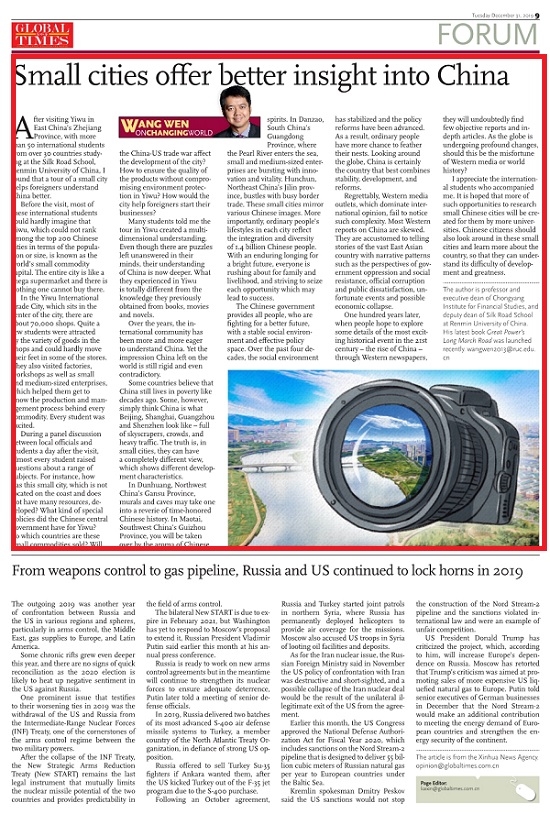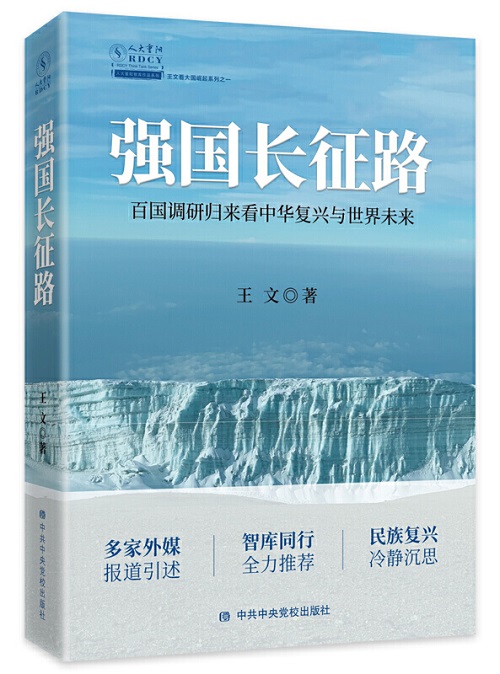Commentaries
Your Present Location: Teacher_Home> Wang Wen> CommentariesWang Wen: Small cities offer better insight into China
By Wang Wen Source: Global Times Published: 2019-12-31

After visiting Yiwu in East China's Zhejiang Province, with more than 50 international students from over 30 countries studying at the Silk Road School, Renmin University of China, I found that a tour of a small city helps foreigners understand China better.
Before the visit, most of these international students could hardly imagine that Yiwu, which could not rank among the top 200 Chinese cities in terms of the population or size, is known as the world's small commodity capital. The entire city is like a mega supermarket and there is nothing one cannot buy there.
In the Yiwu International Trade City, which sits in the center of the city, there are about 70,000 shops. Quite a few students were attracted by the variety of goods in the shops and could hardly move their feet in some of the stores. They also visited factories, workshops as well as small and medium-sized enterprises, which helped them get to know the production and management process behind every commodity. Every student was excited.
During a panel discussion between local officials and students a day after the visit, almost every student raised questions about a range of subjects. For instance, how has this small city, which is not located on the coast and does not have many resources, developed? What kind of special policies did the Chinese central government have for Yiwu? To which countries are these small commodities sold? Will the China-US trade war affect the development of the city? How to ensure the quality of the products without compromising environment protection in Yiwu? How would the city help foreigners start their businesses?

Many students told me the tour in Yiwu created a multi-dimensional understanding. Even though there are puzzles left unanswered in their minds, their understanding of China is now deeper. What they experienced in Yiwu is totally different from the knowledge they previously obtained from books, movies and novels.
Over the years, the international community has been more and more eager to understand China. Yet the impression China left on the world is still rigid and even contradictory.
Some countries believe that China still lives in poverty like decades ago. Some, however, simply think China is what Beijing, Shanghai, Guangzhou and Shenzhen look like - full of skyscrapers, crowds, and heavy traffic. The truth is, in small cities, they can have a completely different view, which shows different development characteristics.
In Dunhuang, Northwest China's Gansu Province, murals and caves may take one into a reverie of time-honored Chinese history. In Maotai, Southwest China's Guizhou Province, you will be taken over by the aroma of Chinese spirits. In Danzao, South China's Guangdong Province, where the Pearl River enters the sea, small and medium-sized enterprises are bursting with innovation and vitality. Hunchun, Northeast China's Jilin province, bustles with busy border trade. These small cities mirror various Chinese images. More importantly, ordinary people's lifestyles in each city reflect the integration and diversity of 1.4 billion Chinese people. With an enduring longing for a bright future, everyone is rushing about for family and livelihood, and striving to seize each opportunity which may lead to success.
The Chinese government provides all people, who are fighting for a better future, with a stable social environment and effective policy space. Over the past four decades, the social environment has stabilized and the policy reforms have been advanced. As a result, ordinary people have more chance to feather their nests. Looking around the globe, China is certainly the country that best combines stability, development, and reforms.
Regrettably, Western media outlets, which dominate international opinion, fail to notice such complexity. Most Western reports on China are skewed. They are accustomed to telling stories of the vast East Asian country with narrative patterns such as the perspectives of government oppression and social resistance, official corruption and public dissatisfaction, unfortunate events and possible economic collapse.
One hundred years later, when people hope to explore some details of the most exciting historical event in the 21st century - the rise of China - through Western newspapers, they will undoubtedly find few objective reports and in-depth articles. As the globe is undergoing profound changes, should this be the misfortune of Western media or world history?
I appreciate the international students who accompanied me. It is hoped that more of such opportunities to research small Chinese cities will be created for them by more universities. Chinese citizens should also look around in these small cities and learn more about the country, so that they can understand its difficulty of development and greatness.
The author is professor and executive dean of Chongyang Institute for Financial Studies, at Renmin University of China and executive director of China-US People-to-People Exchange Research Center. His new book Great Power's Long March Road was launched recently.
























































































 京公网安备 11010802037854号
京公网安备 11010802037854号





